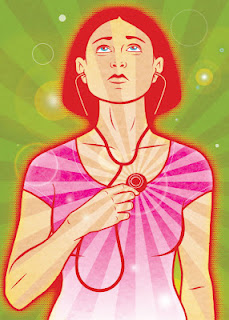Article by Laura B. Hayden first published as Prolonged Grief Increases Young Widows' Health Risks on Technorati on March 11, 2012.
Thirteen years ago I read a letter to an editor urging young widows to go for annual physicals. The timing of the piece reminded me of when I first read about the
Heimlich Maneuver in 1974, just days after my grandfather choked to death on a bite of meat.
My uncle had rushed to Grandpa’s aid, pounding on his back to dislodge the piece of meat – all to no avail. If he had known enough to wrap his arms just above Grandpa’s waist, and pull into his gut, the morsel would have popped out and my grandfather would have survived.
The letter in the newspaper that advocated regular physical exams for young widows jolted me once again, for my 49-year-old husband had died a few weeks earlier
.
One third of the 800,000 people widowed every year are under age 45. And when the death is sudden, as with my young husband's, the
effects on the surviving spouse can be particularly severe and long lasting. Unlike older widows, y
oung widows face the greater part of their lives before them. This puts the younger woman who has lost her husband at greater risk for long-term emotional and physical effects of grief.
GRIEF WRECKS A PHYSICAL AS WELL AS EMOTIONAL TOLL
A year ago, the medical community officially declared
a broken heart can actually trigger a heart attack. “Emotional stress, conceptionally, is the same thing for cardiovascular risk as physical stress,” says
Daniel J.Brotman MD of John Hopkins Hospital. “But a lot of doctors blow that off, because they think emotional stress is a psychological problem, not a physical one.”
When I lost my husband, twelve years ago, my doctor recognized I was in for the long haul. He immediately began monitoring my inevitable symptoms of grief: depression, exhaustion, nervousness, loss of appetite, insomnia, weakness, and aching. New evidence in the 1990s had indicated that grief and its related stress affect young widows more seriously than women who lose their husbands later in life. - because of the longer period of time the younger bereaved would likely experience elevated blood pressure, unhealthful eating habits, and weakened immune systems.
Just after my husband's death the doctor found my blood pressure elevated and he was concerned about my ten-pound weight loss – an outcome friends actually complimented me on – since the short time my husband had died. My doctor also wasn’t surprised I cried during the appointment.
Like most people, I did not feel a rise in my blood pressure. My weight loss certainly didn’t bother me, and I expected I’d be sad for a very long time. Yet, if these symptoms of grief went untreated for an extended period of time – which could be four or five decades for a young widow – unnoticed and insidious damage could escalate. Ultimately it would reveal itself in a critical episode, like a heart attack or a late-stage cancer.
None of my early symptoms of grief called for drastic measures. Yet, my doctor scheduled me for regular blood pressure checks and recommended the children and I see a grief counselor. I followed doctor’s orders through the next annual physical. My weight and blood pressured stabilized. I still grieved, but my physical reactions to my grief were being monitored. The same went for the next year and the one after that.
EARLY DETECTION CAN BE A MATTER OF LIFE OR DEATH
Five years after my husband died I still grieved but I felt fine, physically. I expected to go to my annual exam and not have to see the doctor again for a year. Instead, I got a phone call the day after my appointment.
“There’s blood in your urine and your liver function is off,” he told me on the phone. “We’ve got to find out why.”
I soon learned my "feeling fine" had been deceptive. The next day a tumor the size of my fist appeared atop my right kidney on an ultrasound screen. There had been no pain, no bleeding perceptible to the eye (just microscopic blood cells in my urine sample on the day of my physical), and no palpable lump.
An MRI followed. Then a diagnosis: Late Stage Two kidney cancer. Since I had no risk factors for kidney cancer, my doctor said the high stress I had experienced through five years of grieving could have had a connection to my cancer diagnosis."Possible but not provable," was the way he put it.Yet, I was fortunate. Within weeks, major surgery removed the tumor and kidney - before the cancer had spread. My lymph nodes were clean.
REMAIN VIGILANT AGAINST THE EFFECTS OF PROLONGED GRIEF
Every year, at my annual physical, I still tell my doctor how thankful I am to have found the letter to an editor advocating regular physicals for widows – especially young widows.
“Early detection,” my doctor replies. “Prevention is the way to go.” He doesn’t stop there. “Any loss can have negative cardiac consequences or weaken resistance.” I understand what he is saying. Dealing with a death, a divorce, a loss of a job –all of these create the added stress that can weaken the body and its defense against disease.
Even as a widow I have been lucky in a number of ways. Thirteen years ago, a piece in the morning paper got me to see a doctor in the first place. Then that doctor treated me for silent precursors of heart disease. Five years later, a routine exam detected cancer in an early, curable stage.
I wonder what would have happened if I didn't start seeing a doctor regularly after my husband's death. I am grateful I came across that letter to an editor. I'd like to write it forward.









